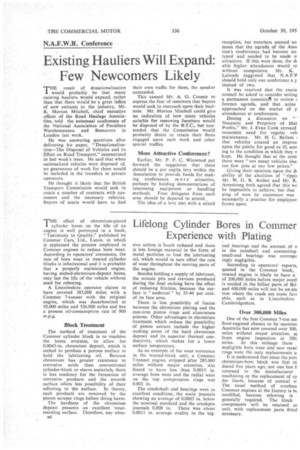Existing Hauliers Will Expand: Few Newcomers Likely
Page 40

If you've noticed an error in this article please click here to report it so we can fix it.
THE result of denationalization would probably be that many existing hauliers would expand, rather than that there would be a great influx of new entrants to the industry, Mr. R. Morton Mitchell, chief executive officer of the Road Haulage Association, told the autumnal conference of the National Association of Furniture Warehousemen and Removers in London last week.
He was answering questions after delivering his paper, "Denationalization—The Disposal of Vehicles and its Effect on Road Transport," summarized in last week's issue. He said that when nationalized vehicles were disposed of, no guarantees of work for them would be included in the transfers to private operators.
He thought it likely that the British Transport Commission would seek to retain a number of contracts with customers and the necessary vehicles. Buyers of assets would have to find their own traffic for them, the speaker contended.
This caused Mr. A. G. Coomb to express the fear of removers that buyers would seek to encroach upon their business. Mr. Morton Mitchell could give no indication of how many vehicles• suitable for removing furniture would be disposed of by the B.T.C., but contended that the Commission would probably desire to retain their fleets engaged upon such work and other special traffics, More Attractive Conferences?
Earlier, Mr. P. F. C. Winwood put forward the suggestion that there should be a per capita levy within the Association to provide funds for making conferences more attractive, perhaps by holding demonstrations of interesting equipment or handling methods. Four delegates from each area should be deputed to attend., The idea of a levy met with a mixed
reception, but members seemed un mous that the agenda of the Asso tion's conferences had become ste. typed and needed to be made rr attractive. If this were done, the di able higher attendances would re without compulsion. Mr. K. Lalonde Suggested that N.A.F.V should hold only one conference a y instead of two.
It was resolved that the execu council be asked to consider setting a permanent committif to review ference agenda, and that areas approached on the matter of p attendances at conferences.
During a discussion on Necessity and Propriety ,of Mal Profits," Mr. J. Evan Cook stressed economic need for regular veh maintenance.. Mr. H. C. Ballam : that vehicles created an imprest upon the public for good or ill, acct ing to the condition in which they v kept. He thought that at the mon there were " too many vehicles cha: too few jobs at too low prices."
Giving their opinions upon the di ability of the abolition of " tippit Mr. W. G. R. Archer and Mr. R. Armstrong both agreed that this wc be impossible to achieve, but that ping of men by customers was necessarily a practice for employeri frown upon.




















































































